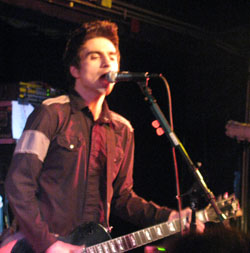D.C. has lost its edge. A mere three decades ago this city was a hub for the clashing of discordant guitars and politically charged lyricism. This was the city that Minor Threat, Bad Brains, and a burgeoning Dischord Records called home.

Times have changed. A quick glance at the flooded schedules of the 9:30 Club and the Black Cat show a scene much more comfortable being in the spotlight. On Tuesday, the Black Cat welcomed punk rock back into the city as five bands joined together under a common goal: to rejoice.
From the street punk stylings of headliner Anti-Flag to the thrash-metal shredding of Darkest Hour, celebration was at the heart of each performance. While punk musicians are not often known to be complacent when it comes to politics and society, on Tuesday they demonstrated the pride of a people willing to make a step towards change. A smile graced the face of all who took the stage, and while each band’s music rang with a tone of dissonance, there was an understanding that their voices had not been ignored.
“We always said if there was going to be a president worth electing, we would come to D.C. and have a party,” Justin Sane, guitarist and lead vocalist for Anti-Flag, said.
While the frontman couldn’t resist showing a little reluctance to trust any politician’s true motives, he found it “refreshing” to hear the president say, “We will extend a hand if you are willing to unclench your fist.”
Anti-Flag took the stage in front of a crowd weakened by the onslaught of the four previous bands, and they unleashed an hour-long blitzkrieg of punk anthems. Songs like “The Press Corpse” seemed like a last goodbye to the 43rd President, while “Underground Network” proved an appropriate fight song for the resilient youth in the audience.
Punk music has always been more about the people than the leadership, preaching that each individual voice deserves a nopen ear, and that, as a collective unit, people can achieve great things. The show was an exhibition of all these values; when a ticket-holder fell amongst the increasingly volatile mosh pit, onlookers immediately lent a helping hand.
The Washington, D.C. of today may be a far cry from its status in the `80s as the capital of political punk rock, but those flames of the past were rekindled Tuesday night, if only for a few hours. Both the crowd and the musicians couldn’t help but notice.





